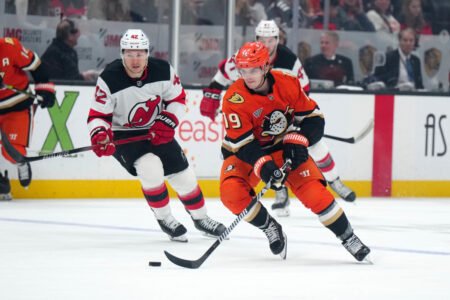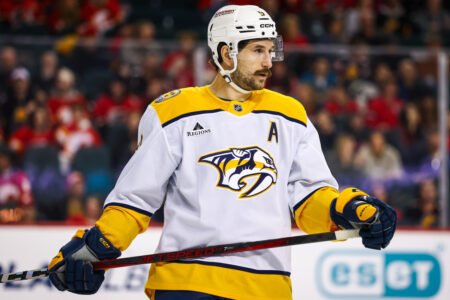The Hockey News’ Money and Power 2025 hockey business annual is available at THN.com/free, featuring the annual 100 people of power and influence list.
W. Graeme Roustan, owner and publisher of The Hockey News, sat down with special guests for peer-to-peer conversations also featured in the issue, including the NHL’s senior executive VP and director of hockey operations, Colin Campbell.
Here’s their full conversation in The Graeme Roustan Show:
Read along with an excerpt from their discussion:
W. GRAEME ROUSTAN: When you made the NHL, that must have been pretty exciting for you and your family.
COLIN CAMPBELL: I went to the (WHA’s) Vancouver Blazers my first year in pro hockey then jumped back to Pittsburgh, who had drafted me, after one year. But it was a good year of hockey. I got to play with Bobby Hull and Gordie Howe. It was better than the minor leagues. I think there were only 16 teams at the time, so it wasn’t easy to make it to the NHL.
WGR: You played in the NHL and you coached in the NHL. Then you went from behind the bench to the front office. Is that how it happened? Gary (Bettman) called you up and said he wanted you to come work in the front office?
CC: Gary called me up. I think it was May. I had a little bit of a run-in with a referee as a coach, and I paid my fine. I’m going, “Why does the commis sioner want to see me?” I went downtown, Gary was asking me all these crazy questions, and I’m trying to figure out where he’s going. Then he said, “Look, they’re looking for someone to replace Brian Burke,” who was moving on to be a GM at the time. I wasn’t quite sure about what the job was. I called up Brian Burke. I also bounced it off Jim Gregory, who was with the league for about 15 years at that time and with the Leafs as a GM for 10 years, and then I said, “I’m going try this for a year or two, learn more about the game and then go back to coaching.” And here I am.
Working for Gary Bettman, it’s hard to find a boss as good as Gary. Gary gets some criticism, but not as much as he used to get. The game’s really good now. Gary is the best boss I’ve ever had. He recognizes the fact that you have a family. He appreciates the fact that you work hard. He’s demanding. There’s no clock on his phone. He’ll call you anytime, and you expect that. He doesn’t keep you on the phone long, and the questions are right to the point, “What’s going on here? What happened there?” I’ve been around a lot of people in sports, but there’s nobody you want in your corner like Gary Bettman. You take a lot of grief in this position, but you work hard, and Gary’s there to support you. When you make tough calls, you upset a lot of people.
WGR: You were inducted into the Hockey Hall of Fame this year. This is the highest pinnacle you can reach in the hockey world. You’re recognized by your peers. You’re voted in. It’s a very small, elite group of individuals who’ve had a big impact on the game of hockey. For you, this must just be the greatest experience, to be in the Hockey Hall of Fame.
CC: From a personal standpoint, having children is a feeling that you don’t know until you actually have them. Especially that first child. This is the same sort of feeling. You’re on top of the world and you say, “OK, I’ve done it all. I’ve got a son or a daughter now.” There’s a real list of good, solid people who have really left their mark on this game in the builder category. I joked around when Mike Gartner and Lanny McDonald called me, “Are you sure it’s not as a player? You don’t think my 25 goals are gonna get me in?” But then I looked at it and I said, “You know, it’s harder to get in as a builder than it is as a player.” There are 300-some players and 140 builders.
WGR: Here we are at the NHL headquarters in Toronto, where you watch all the games every night. That’s part of your responsibility, isn’t it?
CC: Yes, you get that phone call, “You watching my game?” We say, “We’re watching your game, and we’re watching 14 other games as well.” The games start at 7, and, the way expansion has gone, there are very few nights where we’re not going until 1-1:30 in the morning with the West Coast games. It’s tiring, and there are some long days on the weekend when they start at noon and don’t finish until 1-1:30. But, I kid with some of the young people that work in here with us, “What do you do for a living?” “I watch hockey.” “I know you watch hockey, but what do you do for a living?” “I watch hockey.” “I know you watch hockey. What’s your real job?”
For this and more interviews with a deep look into the world of the hockey business, check out The Hockey News’ Money and Power 2025 issue, available at THN.com/free.
Read the full article here














